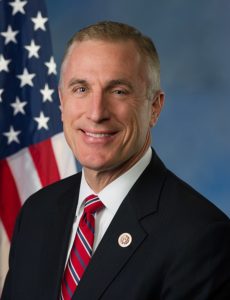Now It’s Personal: When Things Hit Home for Politicians
 Soon-to-be-former Rep. Tim Murphy (R-PA)
Soon-to-be-former Rep. Tim Murphy (R-PA) In one of the most effective moments of the 2012 vice presidential debate between Joe Biden and Paul Ryan, Biden got emotional talking about the issue of abortion. While he was personally a Catholic, he said, and believed in the sanctity of life, he would never try to use the state to force his personal beliefs on others. This is an excellent example of a politician putting aside personal moral considerations to serve the greater good. Recently, we saw the exact opposite situation when it was revealed that (now-resigned) Representative Tim Murphy (R-PA), a staunch political opponent of abortion, encouraged his mistress to, what else, get an abortion.
Politicians often seem to have different standards when it comes to issues that personally affect them. Two modern examples of this are Senator Rob Portman (R-OH) and former vice president Dick Cheney, both of whom changed their positions on gay marriage after having children who came out. The hypocrisy in many of these cases is staggering, but what really concerns me is the underlying cause here: empathy, or rather the conspicuous lack of it. It’s disappointing to imagine that we live in a world where, for many people, an issue does not become real until it affects them personally.
Though not a politician, this “until it happens to me” mindset was perfectly illustrated by the guitarist of a band that had performed hours before the recent shooting in Las Vegas: in the aftermath, Caleb Keeter took to Twitter to say that he, a lifelong supporter of the Second Amendment, had been completely wrong. While it’s nice to see someone with a platform use it to advocate for gun control, it’s again concerning that it took a personal encounter with the horrors that guns create for it to happen.
The Humanist Manifesto III advocates for a life “inspired by compassion,” advice it seems many today would do well to heed. Especially as social media has made it easier for people to share their stories, you would expect that one would no longer have to know a gay couple to support same-sex marriage, or lose a child to gun violence to understand the need for gun control. And yet, we see many things today that contradict these expectations: football fans in a huff about players kneeling during the national anthem because those fans don’t want to take the time to imagine what it might be like to be black in America; policymakers attacking women’s rights regarding contraception and abortion because they’d rather impose their own morality than consider the needs and lives of real women; and the refusal of the United States to vote for a U.N. resolution condemning the practice of death sentences for same-sex sexual activity because, despite supporting that particular sentiment, some still cling to the notion that in other circumstances, taking a life can somehow be a noble act.
I understand that public office requires certain utilitarian decisions that the average person is not usually faced with. Even with that in mind, I believe it is clear that many politicians (and of course many members of the public as well) are not living up to the standards of empathy and compassion that we ought to expect. On the other side of the issue, we see people who are naturally sympathetic and understanding, or have worked to develop these traits. We should all strive to emulate these people, but ought as well to take concrete steps to develop this country’s depleted empathy reserves. One way we can do this is by insisting that public servants model the behavior we expect from the rest of the population. Abortion hypocrite Tim Murphy has already announced his resignation, and we as voters must make it clear that this is what we expect from elected officials: either work to understand the views and needs of marginalized groups, and the impacts of issues that may not affect you personally, or allow yourself to be replaced by someone who can.
